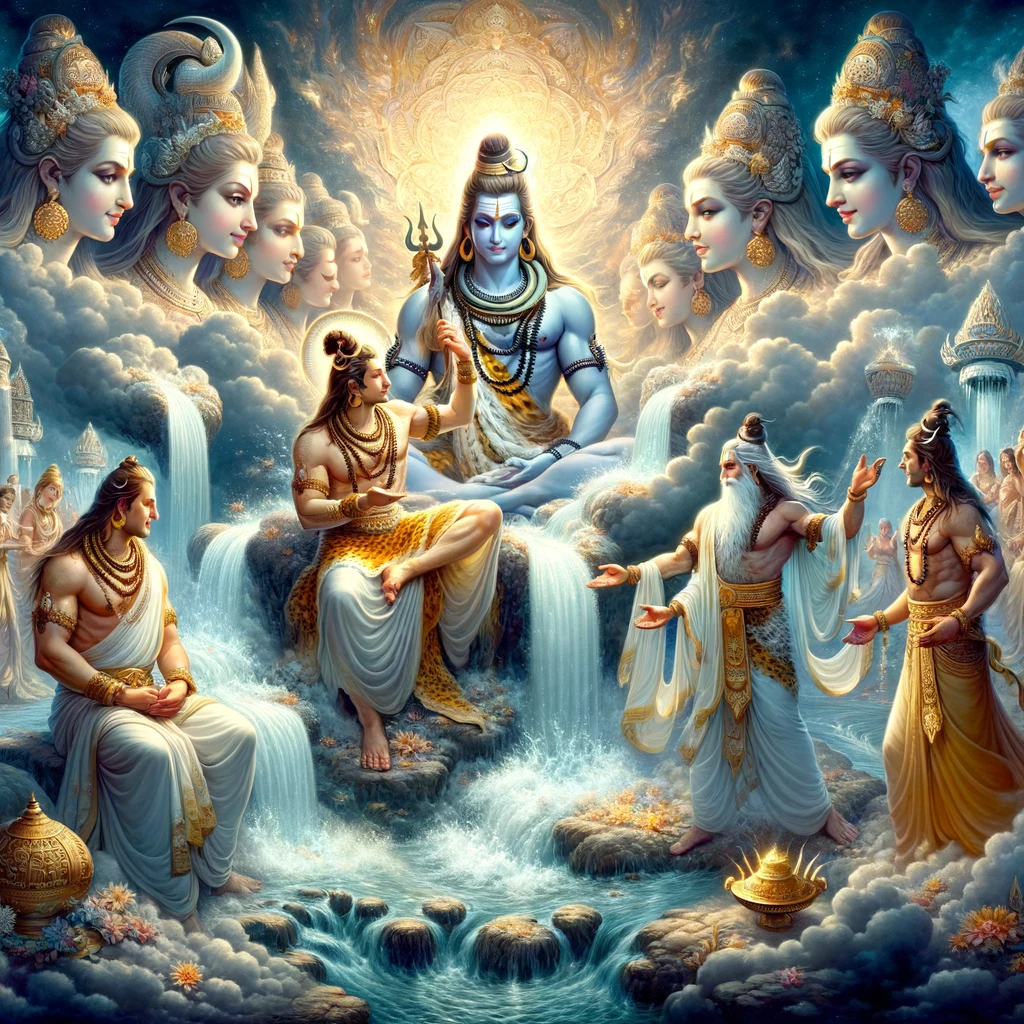Summary
Bhageeratha's effort for bringing Ganga to earth is fulfilled. Anshuman and his son Dileepa could not make any effort to bring the divine river to earth. But Bhageeratha, the son of Dileepa, staunch [faithful] at heart tries earnestly to get her onto earth. Brahma agreeing for this descent of Ganga designates lord Shiva to bear the burden of the onrush of Ganga, because the earth cannot sustain it.
Chapter [Sarga] 42 in Detail
When King Sagara passed away owing to the irrefutable [impossible to prove wrong] virtue of Time, the ministers and subjects of that kingdom are predisposed towards the highly honorable Anshuman to become their king and they enthroned [to seat ceremonially on a throne] him accordingly. Thus Vishvamitra continued narration about the predecessors of Rama. [1-42-1]
He that Anshuman turned out to be a very great king, and oh, Rama of Raghu's dynasty, he begot [got] a marvelous son who is renowned as Dileepa. [1-42-2]
Assigning the kingdom to Dileepa, oh, Rama of Raghu's dynasty, Anshuman undertook very stern asceticism on a pleasant peak of Himalayas desiring the descent of River Ganga to earth. [1-42-3]
On practicing asceticism in ascetic-woods for thirty-two thousand years that highly renowned king Anshuman achieved heaven as he acquired only the wealth of practicing the asceticism. [1-42-4]
The great resplendent Dileepa on hearing the elimination of his grandfathers, the sixty thousand sons of Sagara at the hand of sage Kapila, and with a mind that is marred by the plight of his father Anshuman in absolving [to set free from an obligation] the souls of Sagara's sons, he that Dileepa could not arrive at any decision concerning the descent of Ganga. [1-42-5]
Dileepa became worried as to how River Ganga is to be alighted onto earth from heaven, how water-oblations are to be offered for the souls of Sagara's sons, and how to cross them, the souls, over this mortal world. [1-42-6]
To him who is self-mortified and who is always thinking righteously about the alight of Ganga onto earth, to such a Dileepa a most-virtuous son is born who is renowned by his name Bhageeratha. [1-42-7]
That great-resplendent king Dileepa on his part performed numerous Vedic-rituals, and he ruled the kingdom for thirty thousand years - to the delight of each of his subjects, but could not find a way to fetch Ganga. [1-42-8]
Oh, tigerly-man Rama, that king Dileepa by not attaining any choice towards the uplifting the souls of his grandparents to heaven by bringing Ganga to earth, he took to illness, and he attained the ultimate virtue of Time, namely the demise [death]. [1-42-9]
That best one among men, namely king Dileepa, on anointing [choosing] his son Bhageeratha in the kingdom went to the abode of Indra, namely the heaven, only by his self-acquired merits of deeds. [1-42-10]
Oh, Rama, the legatee of Raghu, but on his part that self-righteous and kingly-sage Bhageeratha is childless, and that great king longed-for offspring. [1-42-11]
Interested in the alighting of River Ganga on earth, oh, Rama, the descendent of Raghu, king Bhageeratha delegated his kingdom to the custody of his ministers and people and firmed up himself in sustained asceticism on Mt. Gokarna in Himalayas, and he practice asceticism standing amid five-fires, upraising his hands, with a monthly sustenance [food and living] and with his sense conquered. [1-42-12, 13a]
Thousands of years have rolled by while Bhageeratha stood practicing his severe asceticism, oh, dexterous Rama, and then the lord and master of all beings, namely God Brahma, is well pleased with that great-souled king's asceticism. [1-42-13b, 14]
Forefather Brahma then arrived along with assemblages of Gods, and spoke this way to the great-souled Bhageeratha who is deep in the practice of asceticism. [1-42-15]
‘Oh, great king Bhageeratha, oh, lord of the people, I am delighted with the perfectly conducted asceticism of yours, hence oh, truly committed one, you may beseech [to request earnestly] for a boon. [1-42-16]
That great resplendent and highly fortunate king Bhageeratha then remaining with suppliantly adjoined palm fold spoke to him who is the Forefather of all worlds, namely Brahma. [1-42-17]
‘Oh, God, if you are satisfied with my asceticism, and if there is any fruition [enjoyment] to the asceticism of mine, let all the sons of Sagara get water oblations through me. [1-42-18]
‘While the ashes of these great souls are drenched with the waters of Ganga, let all of those great-grandfathers of mine depart to heaven, eternally. [1-42-19]
‘Oh, God, I indeed pray for offspring in our Ikshvaku dynasty, let not our dynasty dwindle [shrink or die] as I am issueless, and oh, God, let this be the other boon to me. [1-42-20]
The Forefather of all the worlds, Brahma, then replied the king who has spoken in that way, in an auspicious tongue that is sweet-sounding and sweetly worded, as well. [1-42-21]
‘Oh, top-speeded chariot-rider Bhageeratha, this aspiration of yours is sublime [supreme], and oh, the furtherer of Ikshvaku dynasty, so be it, let safeness betide you. [1-42-22]
'This Ganga is the one with snow-broth, the elder daughter of Himavanta, and oh, king Bhageeratha, God Shiva alone is capable to sustain her force in the course of her alighting onto earth, and in fact, he is to be commissioned for that purpose. [1-42-23]
‘Oh, king Bhageeratha, the earth cannot endure the downfall of Ganga and to sustain Ganga, oh, king, indeed I do not behold none other than the Trident-wielder, God Shiva.' Thus Brahma spoke to Bhageeratha. [1-42-24]
Speaking this way to the king Bhageeratha and informally greeting Ganga also, that Creator of Worlds, Brahma, left for heaven along with all the groups of Gods and Wind-Gods. Thus Vishvamitra continued narration about the arrival of River Ganga to earth. [1-42-25]
Thus, this is the 42nd chapter in Bala Kanda of Valmiki Ramayana, the First Epic poem of India.
Sriman Moola Rama Vijayate


